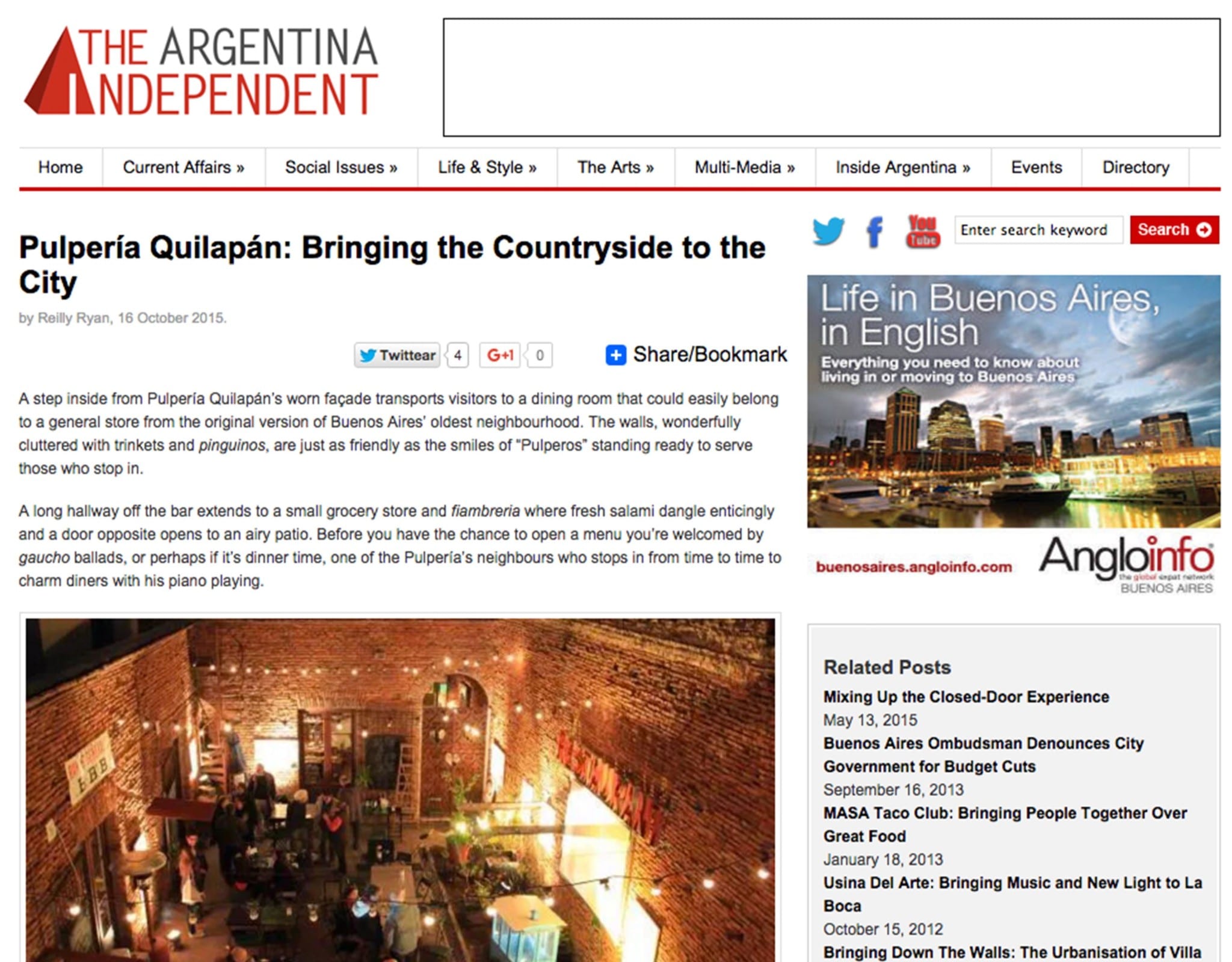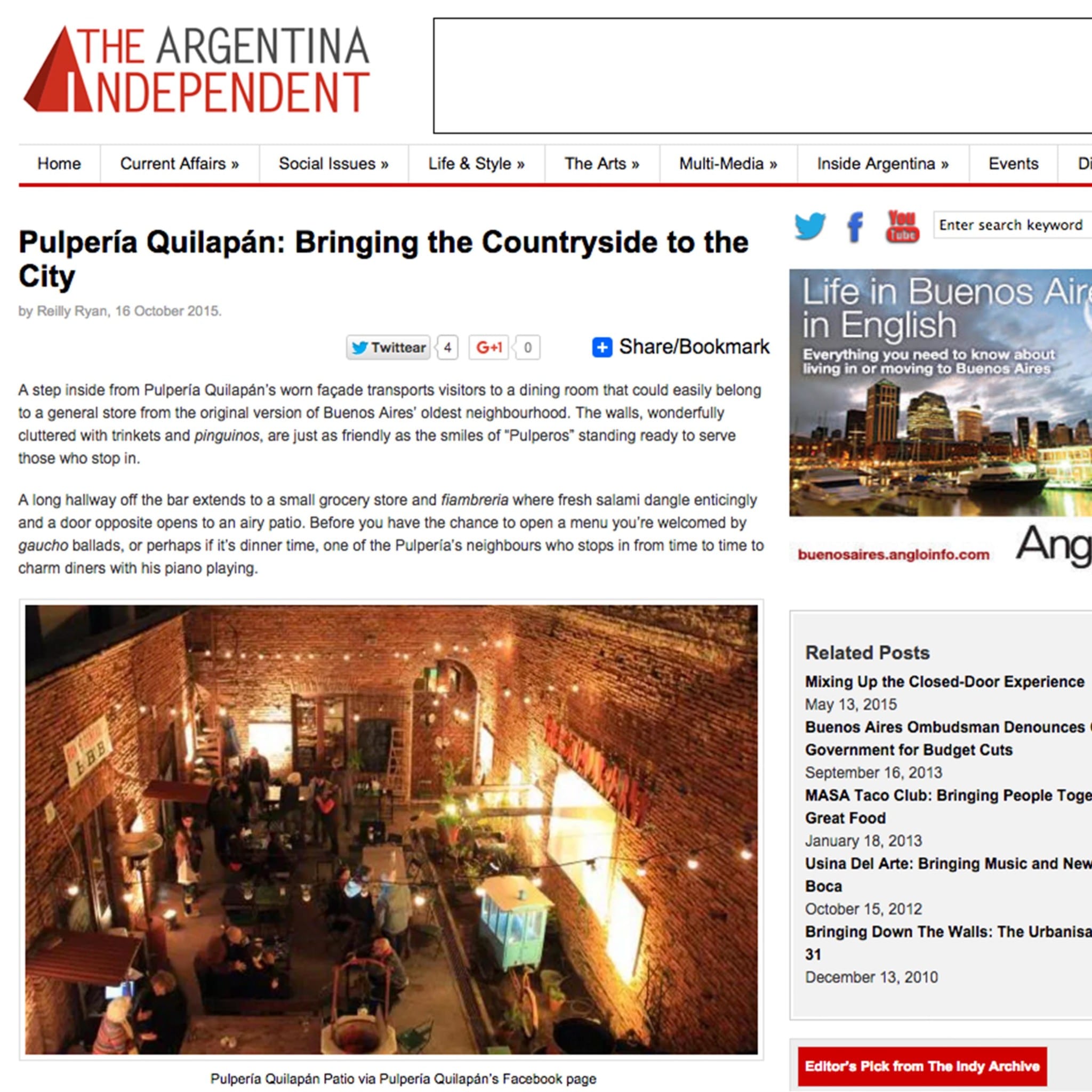A step inside from Pulpería Quilapán’s worn façade transports visitors to a dining room that could easily belong to a general store from the original version of Buenos Aires’ oldest neighbourhood. The walls, wonderfully cluttered with trinkets and pingüinos, are just as friendly as the smiles of “Pulperos” standing ready to serve those who stop in.
A long hallway off the bar extends to a small grocery store and fiambrería where fresh salami dangle enticingly and a door opposite opens to an airy patio. Before you have the chance to open a menu you’re welcomed by gaucho ballads, or perhaps if it’s dinner time, one of the Pulpería’s neighbours who stops in from time to time to charm diners with his piano playing.
The keys to this historic house were handed over to owner Grégoire Fabre and his girlfriend Tatiana in June 2012, and they’ve spent the past three years restoring it into what it is today – a restaurant, social club, grocery store, and as Tatiana described in an interview – a place for people to drink, eat, dance, and laugh (a lot).
The goal of this unique combination was to create a modern-day version of the pulperías from the countryside of long ago. These simple places were considered to be the social centres of small towns where general store and bar combined to provide everything necessary for daily life – cockfights, to coal and candles. The couple, who originally came to Buenos Aires to learn Spanish before moving on to travel the rest of South America, decided to stay and opened the doors to Pulpería Quilapán last March.
It’s obvious from the first trip to the bathroom that the restaurant shoots beyond just serving good food. Bathroom stall diagrams explain how organic waste is recycled through a bio-digester, and the restaurant uses a well found during the renovation of the house to keep rain water which is heated by the roof’s solar panels and sent back into the kitchen and bathroom taps for wash water.
These eco-friendly practices were born from the restaurant’s mission, which is to reconnect the city with the countryside by bringing local, artisanal products to consumers here in Buenos Aires. They try to choose vendors who make a positive social impact, value cultural meaning, and operate with the environment in mind, in the hope that doing so will help preserve the culture and land they have fallen in love with.
As far as what’s coming out of the kitchen, the menu is constantly growing. Alongside traditional Argentine fare, the chefs experiment with indigenous recipes to “bring them back, little by little.” Whether you only have enough room for their flavourful empanadas or you’re ready to indulge in a bife de chorizo, we recommend not skipping their house Malbec that comes affordably at $40 for a small pingüino.
The wait time for dinner can be on the longer side, but you can start with a picada and pass the time by speaking with the amiable servers. Their attentiveness and eagerness to discuss where they work is a refreshing and welcome change of pace from typical porteño customer service.
Even if you’re not hungry, Pulpería Quilapán holds weekly events where visitors from all over Buenos Aires gather for the club’s popular jazz nights, and on other occasions for wine tastings, cooking classes, and domino tournaments. The patio is especially packed with parrilla smoke and music on Sundays, when the San Telmo market is on.
Needless to say, a visit to Pulpería Quilapán is not to be missed. They do a fantastic job honouring traditional Argentine culture with a modern twist by creating a space where meals are to be enjoyed affordably and sustainably.
The restaurant at Defensa 1344 is open Tuesdays through Sundays from 8am to 2am. Weekly events and special menu items can be found on the website or Facebook page.



